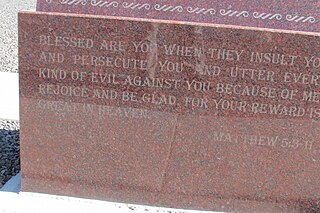Related Research Articles

Paul the Apostle, commonly known as Saint Paul and also known by his Hebrew name Saul of Tarsus, was a Christian apostle who spread the teachings of Jesus in the first-century world. Generally regarded as one of the most important figures of the Apostolic Age, he founded several Christian communities in Asia Minor and Europe from the mid-30s to the mid-50s AD.

Matthew 2:2 is the second verse of the second chapter of the Gospel of Matthew in the New Testament. The magi travelling from the east have arrived at the court of King Herod in Jerusalem and in this verse inform him of their purpose.

Matthew 2:14 is the fourteenth verse of the second chapter of the Gospel of Matthew in the New Testament. Joseph has been warned in a dream that he must flee to Egypt to escape the wrath of King Herod. An event known as the Flight into Egypt.

Matthew 5:10 is the tenth verse of the fifth chapter of the Gospel of Matthew in the New Testament. It is the eighth verse of the Sermon on the Mount, and also eighth, and to some the last, of what are known as the Beatitudes.

Matthew 5:11 is the eleventh verse of the fifth chapter of the Gospel of Matthew in the New Testament. It is the ninth verse of the Sermon on the Mount. Some consider this verse to be the beginning of the last Beatitude, but most disagree. They see it as more of an expansion on the eighth and final Beatitude in the previous verse.

Matthew 6:7 is the seventh verse of the sixth chapter of the Gospel of Matthew in the New Testament and is part of the Sermon on the Mount. This verse continues the discussion on the proper procedure for praying.
Matthew 10:13 is a verse in the ninth chapter of the Gospel of Matthew in the New Testament.
Matthew 10:5 is a verse in the ninth chapter of the Gospel of Matthew in the New Testament.
Matthew 9:17 is a verse in the ninth chapter of the Gospel of Matthew in the New Testament.
Matthew 9:22 is a verse in the ninth chapter of the Gospel of Matthew in the New Testament.
Matthew 9:30 is a verse in the ninth chapter of the Gospel of Matthew in the New Testament.
Matthew 9:34 is a verse in the ninth chapter of the Gospel of Matthew in the New Testament.
Matthew 8:27 is a verse in the eighth chapter of the Gospel of Matthew in the New Testament.
Matthew 10:10 is a verse in the ninth chapter of the Gospel of Matthew in the New Testament.
Matthew 10:14 is a verse in the ninth chapter of the Gospel of Matthew in the New Testament.
Matthew 10:16 is a verse in the ninth chapter of the Gospel of Matthew in the New Testament.
Matthew 10:18 is a verse in the ninth chapter of the Gospel of Matthew in the New Testament.
Matthew 10:22 is a verse in the ninth chapter of the Gospel of Matthew in the New Testament.
Matthew 10:27 is a verse in the ninth chapter of the Gospel of Matthew in the New Testament.

The Coming Persecutions, Matthew 10:16-23, is part of Jesus’ speech of commission to his disciples. Immediately preceding these verses, he had commissioned them to evangelize the Israelites with his authority. As soon as he did this, he moved to telling them of the persecutions they will be subjected to for him, before moving to a description of the world in light of their teaching.
References
- ↑ John MacEvilly, An Exposition of the Gospel of St. John consisting of an analysis of each chapter and of a Commentary critical, exegetical, doctrinal and moral, Dublin Gill & Son 1879.
- ↑ Cornelius Cornelii a Lapide; Thomas Wimberly Mossman The great commentary of Cornelius à Lapide, London: J. Hodges, 1889-1896.
- 1 2 3 4 5 6 7 8 9 10 "Catena aurea: commentary on the four Gospels, collected out of the works of the Fathers: Volume 6, St. John. Oxford: Parker, 1874. Thomas Aquinas".
 This article incorporates text from this source, which is in the public domain.
This article incorporates text from this source, which is in the public domain.